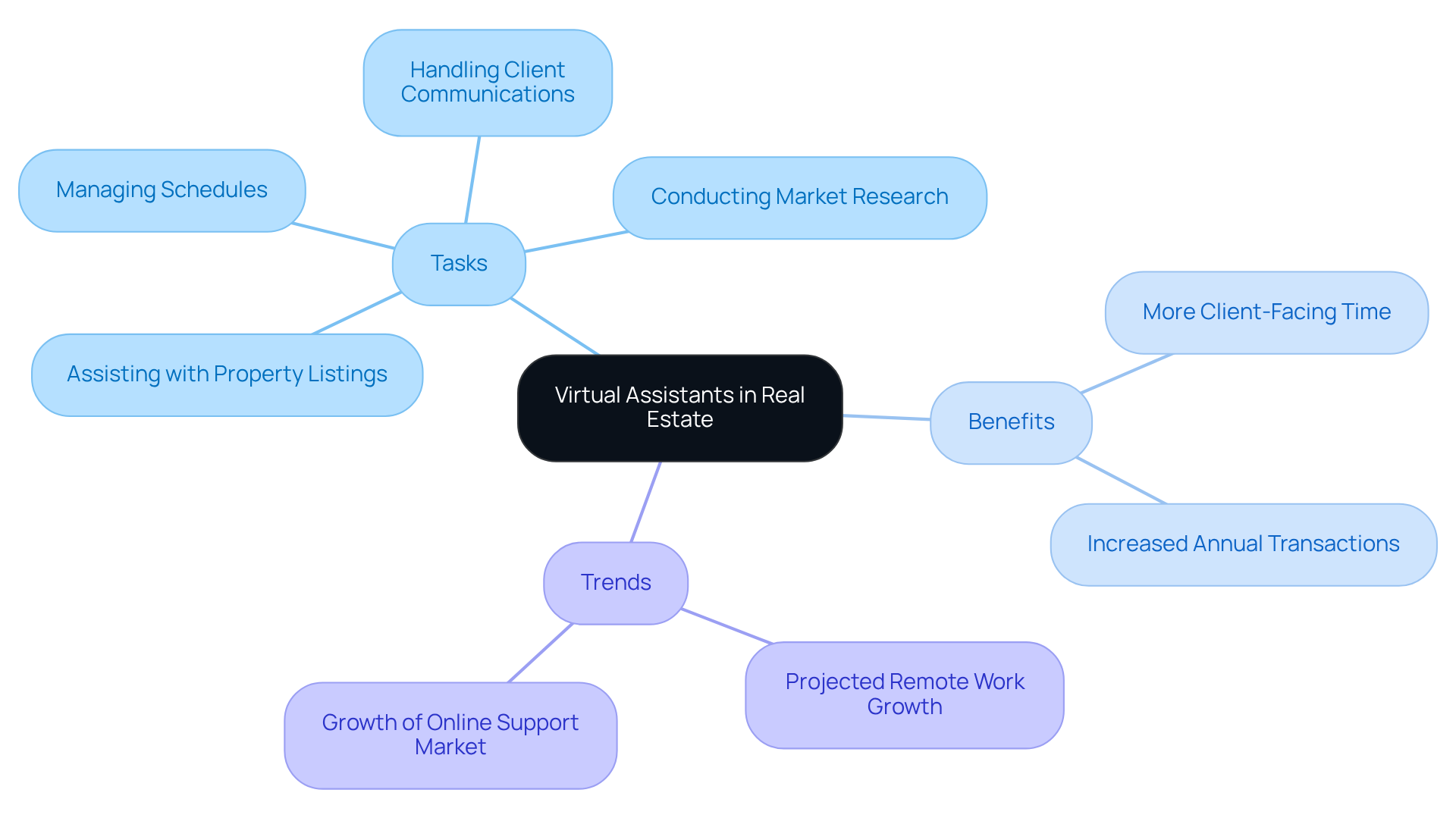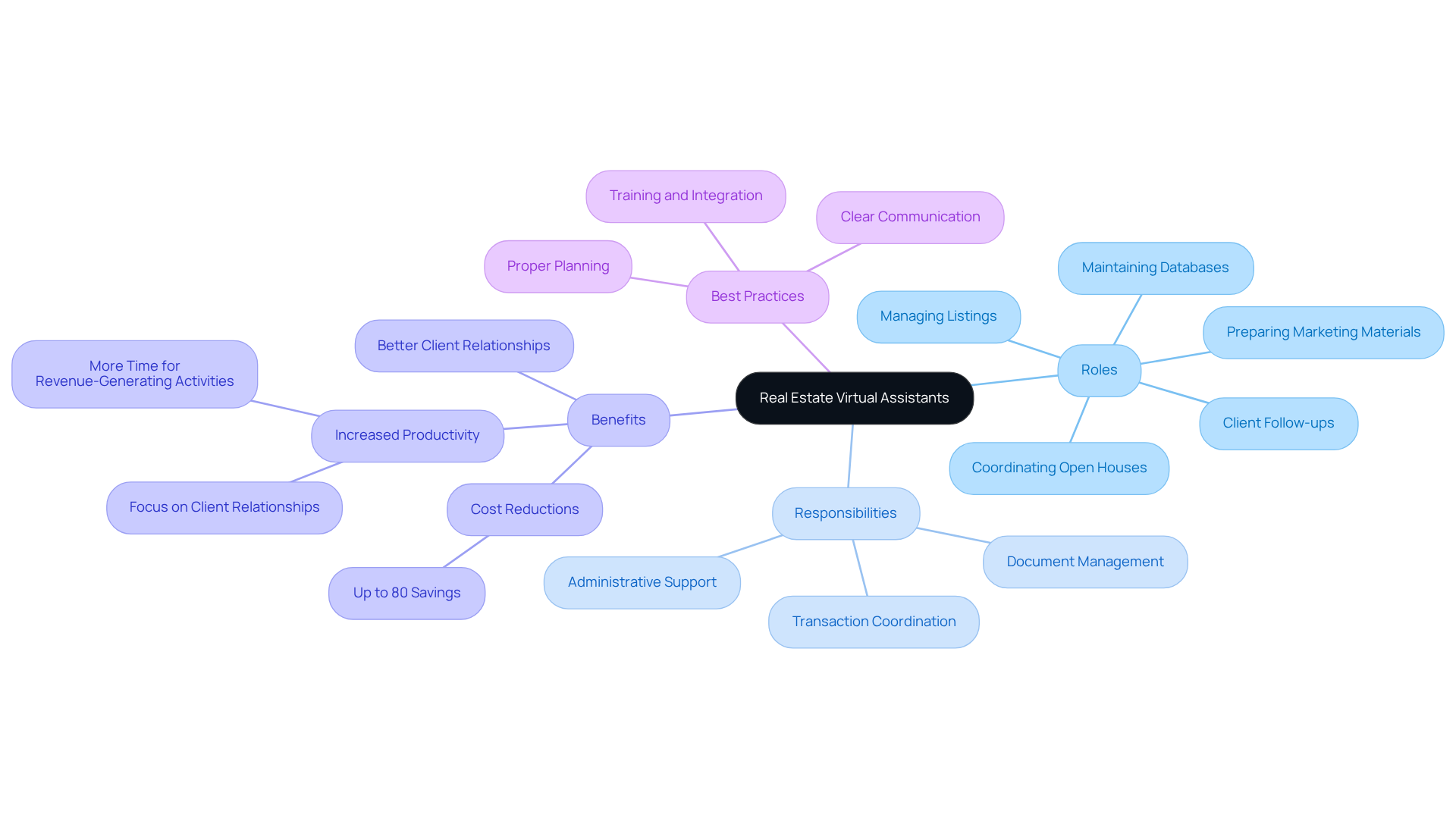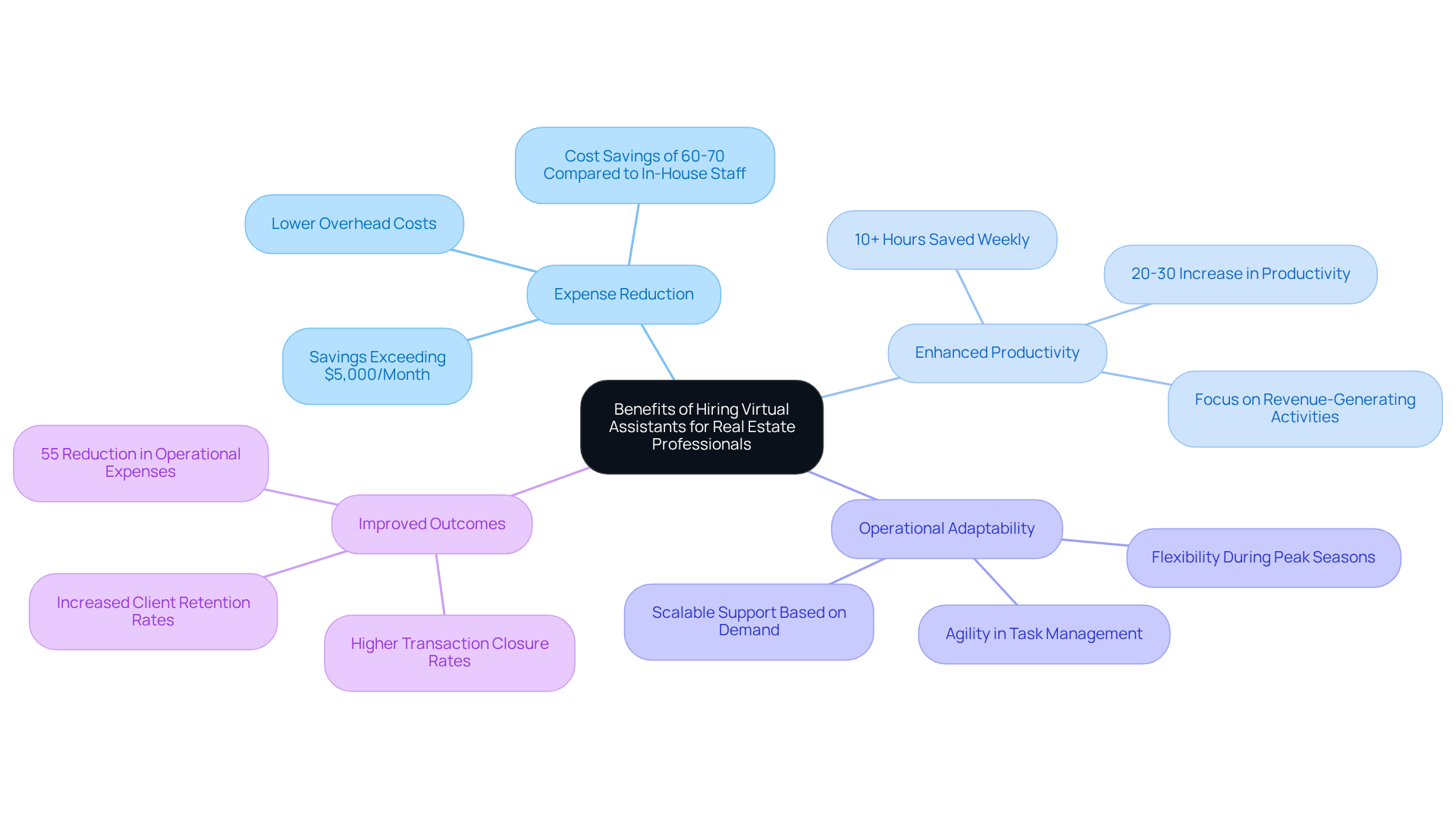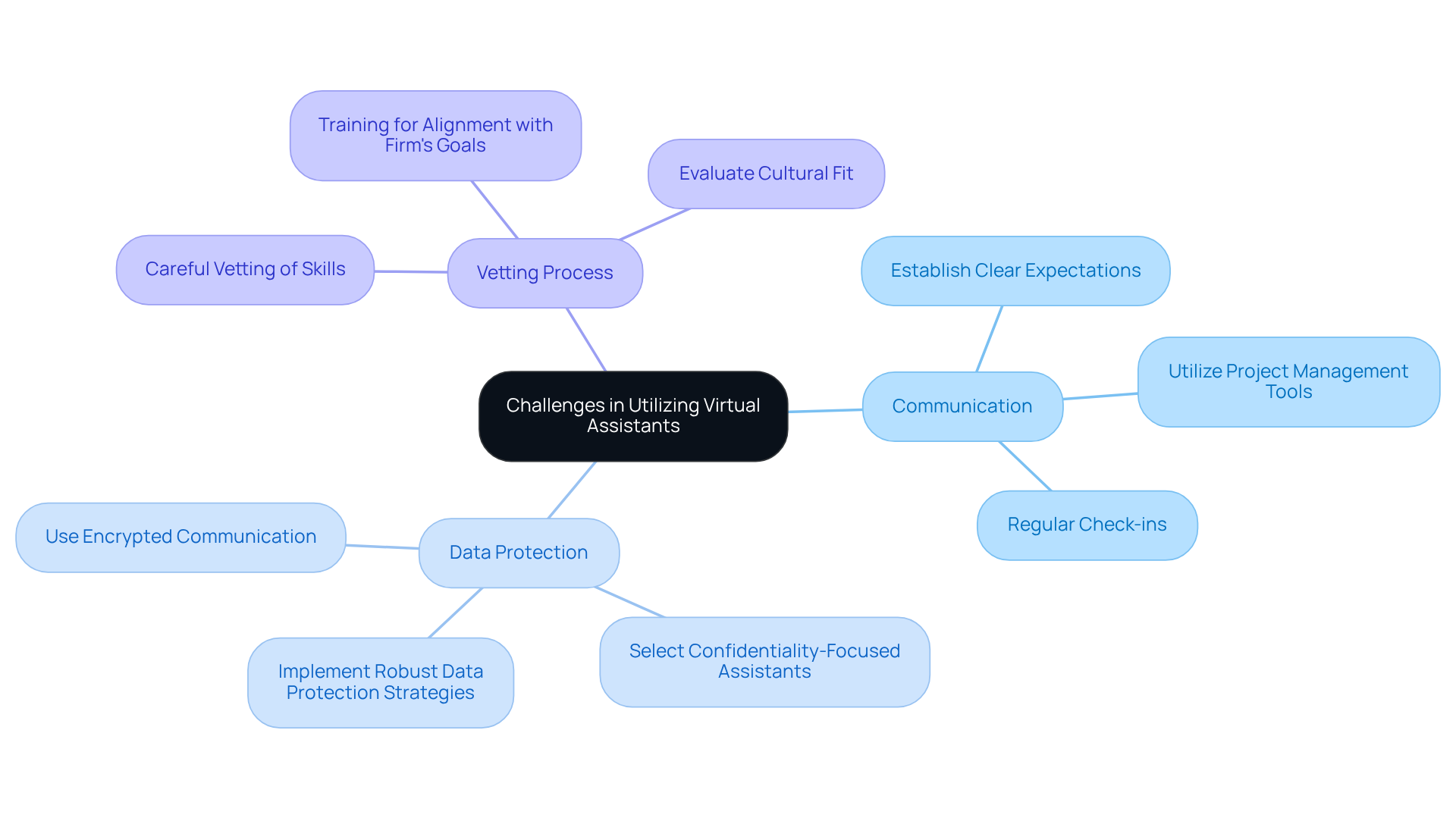Overview
Virtual assistants for real estate professionals deliver essential administrative and operational support, enabling agents to concentrate on client engagement and property transactions. By outsourcing tasks to virtual assistants, real estate agents can significantly reduce costs, enhance productivity, and adapt to workload fluctuations. Consequently, this strategic move ultimately boosts their overall business efficiency.
Introduction
As the real estate landscape evolves, the integration of technology has become indispensable for success. Virtual assistants have emerged as a vital resource for real estate professionals, providing flexible support that streamlines operations and enhances productivity. However, with the myriad of tasks these remote experts can handle, agents must navigate key challenges and considerations to fully leverage this growing trend.
Define Virtual Assistants in Real Estate
Virtual assistants for real estate are remote experts who offer essential administrative, technical, or creative support to agents and companies. They utilize technology to perform a range of tasks, including:
- Managing schedules
- Handling client communications
- Conducting market research
- Assisting with property listings
By operating remotely, these professionals offer flexible assistance tailored to the specific needs of property experts, allowing agents to focus on crucial activities such as client interactions and property showings.
The rise of digital helpers is fueled by advancements in technology and an increasing demand for efficiency in the fast-paced property market. By 2025, it is projected that 73% of industries worldwide will employ remote workers, with a significant portion of property professionals utilizing virtual assistants for real estate in their workflows. This trend signifies a broader shift towards automation and enhanced productivity within the industry.
Moreover, agents who delegate administrative responsibilities can allocate up to 50% more time to direct client-facing activities, leading to an average increase of 38% in annual transactions. The global online support market is anticipated to reach $44.25 billion by 2027, underscoring the growing significance of virtual assistants for real estate.
By leveraging tools such as CRM systems for lead management and transaction management software for document tracking, virtual assistants can optimize operations and boost efficiency, ultimately aiding agents in achieving their business objectives.

Explore Roles and Responsibilities of Real Estate Virtual Assistants
Virtual assistants for real estate are instrumental in streamlining operations by taking on a variety of responsibilities. These include:
- Managing listings across multiple platforms
- Coordinating open houses
- Conducting client follow-ups
- Preparing marketing materials
- Maintaining comprehensive databases of leads and contacts
Furthermore, they play a crucial role in transaction coordination, ensuring that all necessary documents are completed and submitted promptly. By assigning these tasks, property professionals can regain valuable time, enabling them to focus on cultivating client relationships and finalizing agreements. This shift not only enhances productivity but also improves the quality of service provided to clients.
Indeed, research shows that employing virtual assistants for real estate can result in cost reductions of up to 80% in staffing costs, making them an economical option for busy professionals. As emphasized in several case studies, virtual assistants for real estate greatly reduce the load of administrative tasks, allowing agents to concentrate on strategic business objectives and revenue-generating activities.
To maximize the effectiveness of a VA, it is essential to be clear about the results you want and the tasks you want the VA to handle, as emphasized by Joan Bañez. In addition, familiarizing oneself with asynchronous and synchronous communication tools is crucial for effective coordination with the VA. Proper planning and clear communication before hiring a VA are vital for setting expectations and ensuring successful integration into business processes. By employing a VA, property professionals can also free up desk space and mental burden, enabling them to concentrate on more advanced tasks.

Identify Benefits of Hiring Virtual Assistants for Real Estate Professionals
Utilizing virtual assistants for real estate presents significant advantages for property professionals, particularly in expense reduction, enhanced productivity, and operational adaptability. By outsourcing tasks, agents can substantially lower overhead costs typically associated with full-time employees, including benefits and office space.
Furthermore, engaging virtual assistants for real estate on a flexible basis allows real estate experts to adjust their support according to fluctuating workloads, which is especially beneficial during peak seasons when demand surges. This strategic delegation of administrative responsibilities enables agents to concentrate on high-value activities such as client engagement and strategic planning.
Consequently, companies can experience improved outcomes, with many representatives reporting savings exceeding $5,000 each month for each representative by employing remote support rather than internal hires (National Association of Realtors).
In addition, investors who incorporate AI helpers into their operations have witnessed a remarkable 55% reduction in operational expenses, facilitating reinvestment into high-value opportunities. Moreover, investors save over 10 hours each week by assigning administrative duties to remote helpers, further underscoring the efficiency gains achieved through their utilization.
Overall, the employment of virtual assistants for real estate not only streamlines operations but also enables property professionals to prioritize finalizing transactions and nurturing client relationships. In the property industry, virtual assistants for real estate can manage a multitude of responsibilities, including organization, email oversight, and compliance-related tasks, which are crucial.

Discuss Challenges and Considerations in Utilizing Virtual Assistants
While virtual assistants for real estate offer considerable benefits, property professionals must navigate several obstacles. A significant challenge is ensuring effective communication and cooperation, considering that virtual assistants for real estate operate remotely.
Establishing clear expectations and utilizing project management tools are essential strategies to mitigate misunderstandings. Furthermore, real estate experts must prioritize the protection of sensitive client information when sharing data with remote aides. It is crucial to implement robust data protection strategies and select automated helpers who understand the importance of confidentiality.
Finally, identifying the right virtual assistants for real estate with the requisite skills and experience can be a time-consuming endeavor, necessitating careful vetting and training to ensure alignment with the firm's goals and culture.

Conclusion
Virtual assistants are fundamentally transforming the real estate landscape, providing essential support that enables professionals to maximize efficiency and concentrate on core activities. These remote experts manage a variety of administrative, technical, and creative tasks, allowing agents to dedicate more time to client interactions and strategic planning. As the industry evolves, the integration of virtual assistants is not merely beneficial but essential for maintaining competitiveness in a fast-paced market.
This article highlights several key advantages of employing virtual assistants, including:
- Significant cost savings
- Increased productivity
- Enhanced operational flexibility
By outsourcing administrative responsibilities, real estate professionals can reduce overhead costs and better manage their workloads, particularly during peak seasons. Furthermore, the ability to streamline operations through technology and dedicated support staff can lead to improved client services and higher transaction volumes.
In light of the growing reliance on virtual assistants, it is crucial for real estate agents to navigate the associated challenges effectively. Clear communication, robust data protection measures, and careful selection of qualified assistants are essential for successful integration into business processes. Embracing this shift not only enhances individual productivity but also contributes to the overall advancement of the real estate industry. Engaging with virtual assistants is a strategic move that empowers professionals to thrive in an increasingly digital landscape, ultimately leading to greater success and satisfaction in their careers.
Frequently Asked Questions
What are virtual assistants in real estate?
Virtual assistants in real estate are remote experts who provide essential administrative, technical, or creative support to agents and companies, allowing them to focus on core activities.
What tasks do virtual assistants perform for real estate professionals?
They manage schedules, handle client communications, conduct market research, and assist with property listings.
How do virtual assistants help real estate agents?
By operating remotely, virtual assistants offer flexible support tailored to the needs of property experts, enabling agents to allocate more time to client interactions and property showings.
What is driving the rise of virtual assistants in the real estate industry?
The rise is fueled by advancements in technology and an increasing demand for efficiency in the fast-paced property market.
What is the projected workforce trend for remote workers by 2025?
It is projected that 73% of industries worldwide will employ remote workers by 2025, with a significant portion of property professionals utilizing virtual assistants.
How much time can agents save by delegating administrative tasks to virtual assistants?
Agents who delegate administrative responsibilities can allocate up to 50% more time to direct client-facing activities.
What impact can virtual assistants have on annual transactions for real estate agents?
Delegating tasks to virtual assistants can lead to an average increase of 38% in annual transactions for agents.
What is the anticipated value of the global online support market by 2027?
The global online support market is anticipated to reach $44.25 billion by 2027, highlighting the growing significance of virtual assistants in various industries, including real estate.
What tools do virtual assistants use to enhance operations?
Virtual assistants leverage tools such as CRM systems for lead management and transaction management software for document tracking to optimize operations and boost efficiency.




